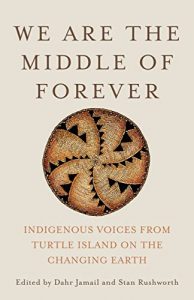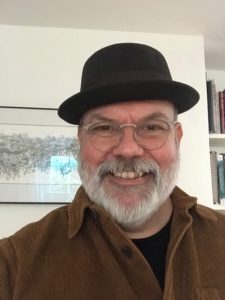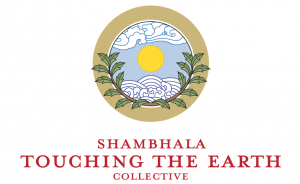Tuesday
UncategorizedA Review of “We are the Middle of Forever: Indigenous Voices from Turtle Island on the Changing Earth”
A Touching the Earth Collective review by Gregory Webster
 I first encountered the work of Dahr Jamail in his brilliant treatise on climate breakdown, The End of Ice. Towards the end of that book we are introduced to Stan Rushworth, an elder of Cherokee descent, who offers some traditional insights to help Jamail wrestle with what his personal response might be when faced with the heartbreaking knowledge of spiralling ecological derangement.
I first encountered the work of Dahr Jamail in his brilliant treatise on climate breakdown, The End of Ice. Towards the end of that book we are introduced to Stan Rushworth, an elder of Cherokee descent, who offers some traditional insights to help Jamail wrestle with what his personal response might be when faced with the heartbreaking knowledge of spiralling ecological derangement.
We are in the Middle of Forever picks up the baton to explore this question further from the perspective of Indigenous wisdom. Jamail and Rushworth interview twenty Indigenous people from around Turtle Island, across a spectrum of ages, communities, places, cultures and experiences. They ask them questions such as: How did we get to this point, and how might we comport ourselves faced with such overwhelm?
Initial themes emerge from the stories told; the vital importance of ceremony, of sweat lodge, talking circles, sun dances, and vision quest; but as the interviews unfold, the horrors of the Indigenous experience in North America since first contact come into view. We hear repeatedly of native children in the school system being told their people are extinct; the deep horrors of the boarding school system – a vicious premeditated attempt to destroy the cultures of native communities by breaking the generational links of wisdom exchange; and we hear of whole communities decimated by ecological collapse caused by invasive industrialisation and development, rendering land unworkable, leading to epidemics of addiction and despair.
These stories puncture the delusion that ecological collapse and climate change are a problem that emerged in the mid to late 20th century; this has been going on for hundreds of years, almost annihilating the very cultures with the tools to mitigate the damage. It is also clear that the invader civilisation remains deeply hostile to the original peoples to this day, albeit using different, more subtle, methods.
It is striking that throughout the interviews, despite all the provocations, hurt, and trauma, there is a sense of dignity and resilience in the face of unforgiving circumstances. The desire to maintain and restore traditional ways of living in relation to the land is obvious, as is the difficulty of doing so in the face of dispersement, mass privatisation of land, and development on sacred sites. The work continues unbowed, and is profoundly inspiring.
We hear of ceremonial burning in the forests of California, hampered by the dead weight of bureaucracy, but pointing towards the potential restoration of ecosystems made impoverished tinderboxes by drought and decades of ill judged fire management; of pioneering sweat lodges established within the penal system when religious freedoms were restored to native communities back in the seventies; and of the battles to protect sacred land from corporate extractionism against long odds. Many of the interviewees are storied academics and community leaders, who must balance maintaining traditional ways of being in the face of the seemingly unending demands of the time poor dominant culture.
Jamail and Rushworth are credited as editors of this collection, but this underplays their contribution in creating the safe container for these stories to be told, for personal histories to be shared within an environment of deep care and listening.
So how should we comport ourselves as we navigate the rapidly changing world around us? Perhaps we should talk less of our individual rights and more about our obligations. Stan Rushworth’s father offered him wise council in the final pages of The End of Ice; “We have to do our best every day. Even if it all goes down, it’s a matter of personal dignity to do everything we can to turn it around.” This theme persists in We are the Middle of Forever. Doing the right thing without expectation of outcome. Surely a mantra for our times.
+
 Gregory Webster is a Trustee of the Berkshire, Buckinghamshire and Oxfordshire Wildlife Trust, the Chair of ecological consultancy Future Nature WTC, and a Shambhala Touching the Earth Collective steering committee member. He lives and works in Oxford, England. https://shambhalaonline.org/touching-the-earth/
Gregory Webster is a Trustee of the Berkshire, Buckinghamshire and Oxfordshire Wildlife Trust, the Chair of ecological consultancy Future Nature WTC, and a Shambhala Touching the Earth Collective steering committee member. He lives and works in Oxford, England. https://shambhalaonline.org/touching-the-earth/


















Jul 29, 2022
Reply
Excellent and insightful!